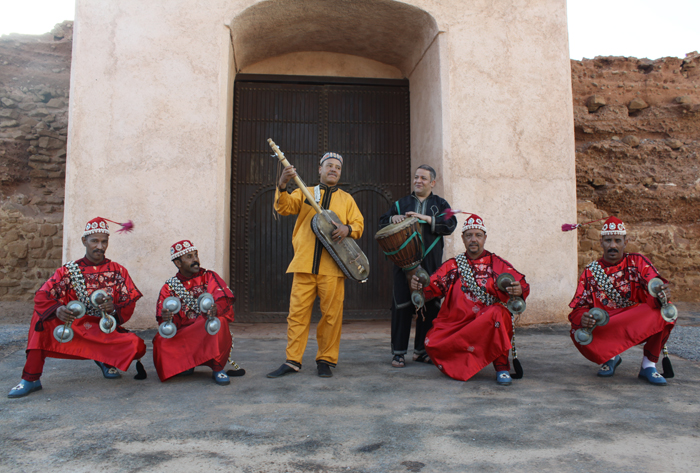Our next 10x10 Arts Series show is just around the corner; Caravanserai: Majid Bekkas Gnawa Ensemble with Brahim Fribgane. If you're anything like me, you're looking at that first word wondering how to even pronounce it, let alone figure out what it means. Let me break it down for you phonetically: Kara-van-sir-eye. There, see? It's not that hard. :)
 Majid Bekkas Gnawa EnsembleNow, let's talk about what it means. From their website: Caravanserai: A place where cultures meet creates new pathways for Americans to experience the diversity of contemporary Muslim artistic expressions by introducing U.S. audiences to exciting and dynamic artists from the Muslim world. Sounds pretty interesting, right?
Majid Bekkas Gnawa EnsembleNow, let's talk about what it means. From their website: Caravanserai: A place where cultures meet creates new pathways for Americans to experience the diversity of contemporary Muslim artistic expressions by introducing U.S. audiences to exciting and dynamic artists from the Muslim world. Sounds pretty interesting, right?
We're very much looking forward to hosting this performance next Thursday, October 18 at Walton Arts Center. They are only traveling to four places in the United States this year (Tennessee, North Dakota, Minnesota and Arkansas)!
 Brahim FribganeAs per usual, we like to find out more about these artists before they arrive. There were so many things we wanted to ask, but alas, we had to temper ourselves to make sure we don't overwhelm them. :) Read on to find out more about the artists behind Caravanserai: Majid Bekkas Gnawa Ensemble with Brahim Fribgane.
Brahim FribganeAs per usual, we like to find out more about these artists before they arrive. There were so many things we wanted to ask, but alas, we had to temper ourselves to make sure we don't overwhelm them. :) Read on to find out more about the artists behind Caravanserai: Majid Bekkas Gnawa Ensemble with Brahim Fribgane.
1. What are you most looking forward to on this US Tour?
Majid - The chance to share my culture and my community with American people and to let them discover our music and way of life - the things they cannot learn in books or through movies or television.
Brahim - Looking forward to sharing the art and music that I learned back home. And to connect with American audiences in terms of seeing us differently than how the media portrays us. I want to share with happiness because whatever you feel in music we all feel it together. We are the same inside.
2. What size of audiences and whom do you typically perform for in Morocco?
Majid – Mostly festivals with many young people - some have thousands of peope like the Essaouria Gnawa World Music Festival which can have as many as 50,000 in the audience. Sometimes I do concerts in theatres and special places for people that know about music like teachers and students at universities in Morocco that are much more intimate. I alos perform in jazz clubs in Europe.
Brahim – I performed with Hassan Hakmoun and Peter Gabriel at Woodstock in 1994 and some big festivals in Europe. I also do a lot of jazz clubs and more intimate setting with with my jazz group Club d’Elf and Medeski, Martin and Wood and a band called Moving Picture with Adam Rudoloph.
3. Explain the tradition of twirling the hat? Why do only men do it - is it a religious act or just something fun to do?
It is not a religious act like a dervish. It is not about connecting with the divine or achieving a trance or anything. It is just fun. It is to make people smile and add color to the performance. One legend goes that the first slave emancipated by Mohammed named Bilal was asked to be the first mushin (the person who calls people to prayer). Mohammed’s cousin Ali was having trouble with his wife and Bilal created the quarqabs (the castanet we play)and the twirly hat to sing and dance and make them happy to bring Ali and his wife back together.
4. What is your most favorite Moroccan dish/meal to prepare?
Majid - My specialty is fish tagine cooked with tomatoes, garlic and olive oil spiced with cumin, pepper, paprika, lemons and parsley.
Brahim – sfinge it is a fried bread like a donut that makes me think of home. Mint tea with sugar too.
Other members of the ensemble: Sidi Abellfattah El Houssaini likes ice cream vanilla, Fath Allah Chaouki likes shell fish, Abdelhafid Oummane likes couscous with chicken and vegetables, Mesbah Chaouki likes bouzroug (mussels), and Abdessadek Bounhar likes everything…he is an “every-terian.” (<--ha! We love this!)
5. How did you learn how to play your instrument? When?
Majid - I learned to play guembri in Sale where I was born with a master named Bahaman. I started playing guenbri and banjo when I was fourteen in the early seventies. There was a band called Nass Ghiwane known as “The Beatles of Morocco” that inspired me.
Brahim - I was thirteen or fourteen. I was born in Casablanca and I was influenced also by Nass Ghiwane. The first instrument I learned was harmonica because of Bollywood movies I saw often at the cinema when I was a kid.
6. What are 3 goals of your performances? What do you want audiences to walk away with?
Majid – First to have the audience accept and enjoy it, the second is if we can have people sing and participate with us like clap or whatnot we feel like we are sharing, and third to bring the message of love and peace in this world. Musicians are the best ambassadors.
Brahim – First to tell people that Muslims are not only what they see on tv and read in the papers - burning flags and being violent. We are people of peace like them. Also that people will learn about my amazing culture and my language and my tribe from the Souss or South part of Morocco, and third that we are making peace with music and music with peace.
7. What makes you unique from other performers?
Brahim - Every musician plays with his own hands, and his own life influences. That is what makes me unique. Your roots and experiences make you “you” and this makes the sound you play or the song you sing unique.
 Majid Bekkas Gnawa Ensemble in Morocco. Photo by Hassan Abdellaoui.
Majid Bekkas Gnawa Ensemble in Morocco. Photo by Hassan Abdellaoui.
8. Do you have any superstitions or backstage rituals, before you go on stage?
Everything that we do we say “bismillah” before we eat, before we put on our clothes in the morning, before we do anything. It is a blessing and a prayer and it means “in the name of God.”
9. Is there something you enjoy collecting?
Abdelfattah {ensemble member} collects percussion instruments and noisemakers. We all like to fish, and play soccer.
10. Was there some great advice you received as you began your artistic journey?
Brahim- The great musician Ali Farka Toure told me “whenever you play your instrument, be yourself, do not try to be anyone else. “
Majid – When I released my album African Gnoua Blues I received a call from from famous American jazz legend Archie Shepp and he told me “You are in the right direction. Now I understand how near gnawa is to the blues and jazz.” Then he invited me to play with him in Paris!
11. What profession other than yours would you most like to attempt?
Abdelfattah - ice cream maker
Brahim - When I was young I wanted to be a merchant marine so I could sail and see the world.
Abdelhafid – carpenter
Mesbah – electrician
Abdessadek – sales…business
Fath Allah - only gnawa nothing else
Majid – teacher…but I want to me a musician all my life.
Turns out we're not too different from our friends across the globe. I mean, who doesn't like ice cream? Come join us for their performance on October 18, and don't forget to come early for the pre-show conversation at 6pm!
If you'd like to find out more about Caravanserai, please visit their website.
